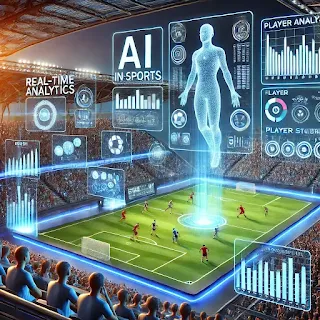AI in Sports: How Technology is Changing the Game.
Introduction.
Artificial Intelligence (AI) is transforming the sports industry in ways never imagined before. From performance analysis to injury prevention and even AI-powered referees, technology is reshaping how games are played, coached, and experienced by fans.
In this article, we’ll explore how AI is revolutionizing sports and what the future holds for athletes, coaches, and fans alike.
1. AI in Player Performance Analysis
AI-driven analytics tools have changed the way teams evaluate player performance. Machine learning algorithms can analyze thousands of game scenarios, player movements, and opponent strategies to help teams make better tactical decisions.
Examples of AI in Performance Analysis:
✔ Hawk-Eye Technology: Used in tennis, cricket, and football to track ball movement with high precision.
✔ SportVU: An NBA system that tracks player movement in real time to generate advanced statistics.
✔ Catapult GPS Trackers: Devices worn by players to monitor speed, heart rate, and fatigue levels.
Impact: AI helps coaches create personalized training regimens and optimize player stamina, reducing the risk of injuries.
2. AI Referees: The Future of Fair Play?
Refereeing has always been a controversial aspect of sports, but AI is making officiating more accurate and fair.
How AI is Improving Refereeing:
✔ VAR (Video Assistant Referee): Used in football to review decisions.
✔ AI-Powered Offside Detection: FIFA is testing AI systems that can detect offsides instantly.
✔ Automated Line Calling in Tennis: The US Open has eliminated human line judges in favor of AI-based calls.
Impact: AI reduces human error and biases, ensuring fair play in competitive sports.
3. AI in Injury Prevention & Recovery
Injuries can change the course of an athlete’s career, but AI is helping in both prevention and recovery.
How AI Helps Prevent Injuries:
✔ AI-Powered Wearables: Smart devices monitor player fatigue and movement to prevent overuse injuries.
✔ Biomechanical Analysis: AI examines an athlete’s running style to detect potential injury risks.
✔ AI-Based Rehabilitation: AI-driven physical therapy programs help injured athletes recover faster.
Impact: Teams can extend players’ careers and maintain peak performance through AI-driven health monitoring.
4. AI in Fan Engagement & Virtual Sports
The sports fan experience is evolving with AI-driven insights and virtual interactions.
AI Innovations in Fan Experience:
✔ AI Chatbots: Virtual assistants provide real-time match updates and stats.
✔ AI-Generated Highlights: Automated highlight reels personalize content for fans.
✔ Metaverse & Virtual Sports: AI-powered simulations are creating virtual sports leagues in the Metaverse.
Impact: AI enhances fan engagement, making sports more interactive and immersive.
5. AI and Smart Stadiums
Modern stadiums are incorporating AI to enhance security, ticketing, and overall spectator experience.
AI in Stadium Operations:
✔ AI-Based Crowd Management: Facial recognition and predictive analytics ensure smooth entry.
✔ Smart Ticketing: AI-powered dynamic pricing adjusts ticket costs based on demand.
✔ AI-Optimized Food & Beverage Services: AI predicts peak demand for food stalls to reduce waiting times.
Impact: AI-driven stadiums provide a more seamless and enjoyable experience for fans.
Conclusion
AI is revolutionizing the sports industry at every level—from player performance and injury prevention to fan engagement and stadium operations. As technology continues to evolve, the future of sports will become even more data-driven, efficient, and engaging for both athletes and fans.
Key Takeaways:
✔ AI enhances player performance through advanced analytics.
✔ AI-powered referees reduce human error in officiating.
✔ AI prevents injuries and speeds up recovery for athletes.
✔ AI is transforming fan engagement with chatbots and virtual experiences.
✔ Smart stadiums use AI for security, ticketing, and crowd management.
The question remains: Will AI take over coaching and refereeing completely, or will human intuition always be necessary in sports.








.webp)





0 Comments